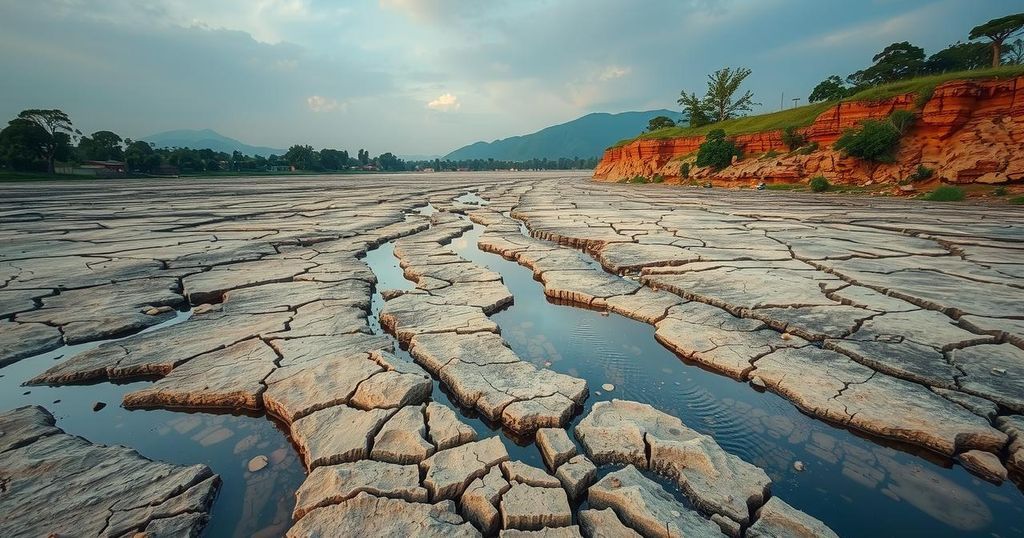Drought Impacts Kariba Dam: Power Cuts Devastate Zambia and Zimbabwe’s Economies
A severe drought has drastically reduced water levels in Lake Kariba, impacting hydropower generation in Zambia and Zimbabwe and leading to extensive power outages. As the region faces significant economic challenges, authorities are urged to explore diversified energy sources and strategies to manage their water resources effectively amidst climate change impacts.
The current drought ravaging Zambia and Zimbabwe has significantly affected Lake Kariba, the world’s largest human-made lake, compromising its water levels to near record lows. Consequently, the Kariba Dam, which is pivotal for hydropower generation in both nations, faces the unprecedented possibility of being shut down for the first time in its 65-year existence. This dire situation has resulted in severe ramifications, including extensive power outages—up to 21 hours a day in Zambia and 17 hours in Zimbabwe—devastating local economies. The drought’s origins can be traced back to the recent impacts of El Niño, which brought the worst mid-rainy season dry spell witnessed in Southern Africa in a century. As a result, authorities have had to ration the water released through the dam, exacerbating electricity shortages that have affected daily life and economic productivity. With Zambia’s power company Zesco experiencing difficulties in maintaining consistent power supply, citizens express frustration and distress over their inability to fulfill business and domestic energy needs, compounding the ongoing economic challenges driven by high inflation and recovery from previous debt crises. Historical context reveals that Lake Kariba was created between 1955 and 1959, displacing thousands of residents and wildlife in the process. Today, the Zambezi River Authority oversees the distribution of water between Zambia and Zimbabwe, but dwindling levels have brought significant operational challenges. Zesco’s director admitted that the intensity of the current drought far exceeded initial forecasts, with both nations recognizing the urgent need to diversify energy sources to mitigate further risks from climate-induced changes. Recent assessments indicate detrimental impacts on agriculture, with entire crop failures reported across southern Africa, leading to a state of national disaster in several countries. Local fishermen lament the drastic reduction in their catches, illustrating the extensive ecological ramifications of lowered lake levels. Compounding the atmosphere of uncertainty, economic projections for Zimbabwe’s growth have been downgraded, and Zambia’s estimated growth has also faltered due to the power crisis. However, there remains hope as the forthcoming rainy season, anticipated to initiate in November and continue through April, may provide some relief. Acknowledging the imperative of energy security, decision-makers are now exploring alternatives including coal and renewable energy sources to enhance stability in the future. Despite the immediate challenges, there is a priority on ensuring that the lessons from past droughts lead to improved preparedness and response strategies going forward.
Lake Kariba serves a critical role in the energy infrastructure of Zambia and Zimbabwe, holding significant importance for local economies reliant on hydropower. It was constructed during the colonial era and has since become a symbol of cooperation between the two nations regarding water resource management. The recent El Niño-induced drought has underscored vulnerabilities in their energy sector, highlighting the complex interplay between climate variability, energy needs, and economic stability. With power outages creating dire economic repercussions, it emphasizes the urgent necessity for diversified energy solutions and renewed strategies in water management to combat the effects of climate change.
The drought affecting Lake Kariba has reached an alarming level, jeopardizing the hydropower generation capabilities of Zambia and Zimbabwe. This environmental crisis has initiated significant economic challenges, characterized by power outages and agricultural failures, prompting calls for more robust energy diversification. As both countries grapple with the fallout of this record drought, they must prioritize sustainable practices and develop comprehensive strategies that mitigate future climate vulnerabilities to safeguard their economic futures.
Original Source: www.theguardian.com




Post Comment